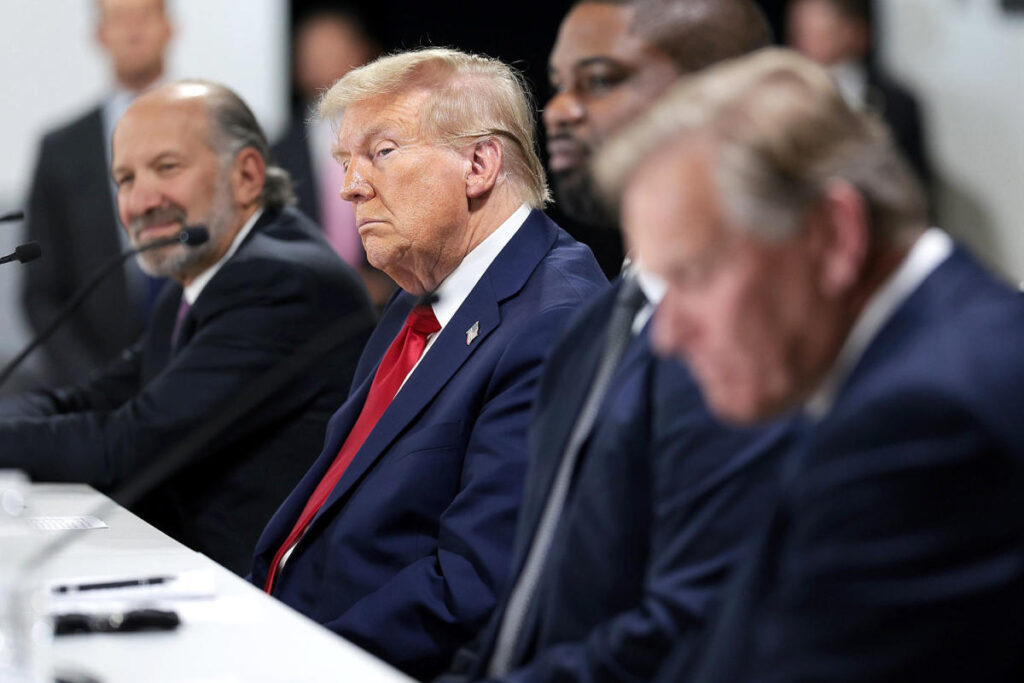In a recent campaign event, Vice President Kamala Harris released a video clip that seemed to show former President Donald Trump nodding off, a move aimed at highlighting concerns about his fitness to run for office. The post, shared on X (formerly Twitter), included footage from a campaign roundtable in Michigan, where Trump appeared to struggle to stay awake. The Harris campaign is leveraging this footage as part of a broader narrative that depicts Trump as “exhausted” and unprepared for the demands of a presidential race. The Trump campaign did not comment on the incident, but the attempt to portray him as weary follows a report from Politico indicating that a Trump adviser claimed he was turning down interviews due to fatigue.
Harris reinforced this messaging during her remarks in Grand Rapids, Michigan, where she expressed concern over Trump’s suitability for the presidency, given the strenuous nature of the role. Highlighting the challenges of the job, she questioned whether Trump’s exhaustion indicated he was fit to lead. During her rallies in Michigan, she echoed this sentiment, suggesting that his apparent fatigue raises serious doubts about his capabilities to handle the responsibilities of the presidency effectively.
In response to the Politico report that insinuated Trump’s declining interview requests due to exhaustion, the Trump campaign criticized the media’s interpretation, asserting that their candidate has maintained a robust schedule of media appearances, surpassing that of Harris. They framed Harris’s claims about Trump’s energy levels as unfounded, seeking to counter the narrative that he is not up to the rigors of campaigning. Trump himself dismissed the allegations of being tired, abruptly stating that he felt “really exhilarated” after 48 days of non-stop campaigning and criticized Harris for lacking energy in comparison.
During a Q&A session, when journalists pressed Trump about the allegations made by Harris, he vehemently denied any cancellation of events. Despite reports to the contrary regarding his campaign engagements, Trump maintained his image of having an unwavering stamina. His comments further emphasized his attempt to position himself as more energetic than Harris, remarking dismissively about her performance and commitment compared to his rigorous campaign schedule. He even referenced an event Harris attended instead of a Catholic charity dinner he claimed she should have been at.
Interestingly, Trump has faced scrutiny in the past for appearing to doze off during significant moments, such as his hush-money trial in New York earlier this year, where he was accused of zoning out during witness testimonies. Trump rebuffed these claims on his social media platform, asserting that he was simply listening intently rather than falling asleep. This strong rebuttal reflects his strategy to project an image of keen awareness and engagement, opposing the narrative being put forth by the Harris campaign.
This exchange highlights a broader narrative playing out in the presidential campaign, where physical energy and perceived vitality can influence voter perceptions. Both campaigns are navigating a politically charged climate, using media moments to bolster their narratives about their candidates. Harris’s framing of Trump as exhausted aims to shape voter opinion regarding Trump’s qualifications for office, while Trump’s counterattack seeks to position him as vigorous and ready to take on the challenges of a presidential campaign, despite the contrasting images being fed to the electorate. The outcome of this verbal sparring will likely play a significant role in how both candidates are perceived as they head further into the campaign season.

